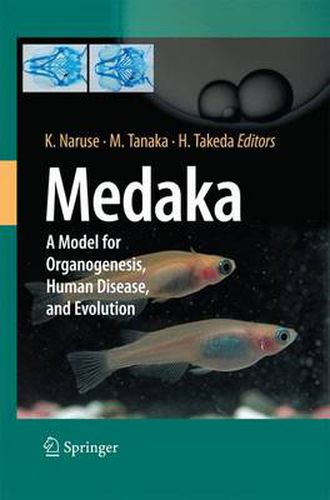Readings Newsletter
Become a Readings Member to make your shopping experience even easier.
Sign in or sign up for free!
You’re not far away from qualifying for FREE standard shipping within Australia
You’ve qualified for FREE standard shipping within Australia
The cart is loading…






This title is printed to order. This book may have been self-published. If so, we cannot guarantee the quality of the content. In the main most books will have gone through the editing process however some may not. We therefore suggest that you be aware of this before ordering this book. If in doubt check either the author or publisher’s details as we are unable to accept any returns unless they are faulty. Please contact us if you have any questions.
Oryzias latipes, known as medaka, is a model organism from East Asia. Breeding of this small, egg-laying freshwater teleost fish has long been popular among hobbyists in Japan. Now, as biological science has entered the genome era, the medaka provides significant advantages that make it one of the most valuable vertebrate models: a large collection of spontaneous mutants collected over a century, the presence of highly polymorphic inbred lines established over decades, and a recently completed genome sequence. This book is the first comprehensive monograph to cover a variety of medaka research. It opens with a historical view of medaka, followed by a series of research topics in the four major areas where the medaka is increasingly important: genomics, genetics, and resources; organogenesis and disease models; germ cells, sex determination, and reproduction; and evolution. Readers will find state-of-the-art information on medaka genetics and genomics such as the first isolation of active transposons in vertebrates, the influence of chromatin structure on sequence variation, fine QTL analysis, and versatile mutants as human disease models.
$9.00 standard shipping within Australia
FREE standard shipping within Australia for orders over $100.00
Express & International shipping calculated at checkout
This title is printed to order. This book may have been self-published. If so, we cannot guarantee the quality of the content. In the main most books will have gone through the editing process however some may not. We therefore suggest that you be aware of this before ordering this book. If in doubt check either the author or publisher’s details as we are unable to accept any returns unless they are faulty. Please contact us if you have any questions.
Oryzias latipes, known as medaka, is a model organism from East Asia. Breeding of this small, egg-laying freshwater teleost fish has long been popular among hobbyists in Japan. Now, as biological science has entered the genome era, the medaka provides significant advantages that make it one of the most valuable vertebrate models: a large collection of spontaneous mutants collected over a century, the presence of highly polymorphic inbred lines established over decades, and a recently completed genome sequence. This book is the first comprehensive monograph to cover a variety of medaka research. It opens with a historical view of medaka, followed by a series of research topics in the four major areas where the medaka is increasingly important: genomics, genetics, and resources; organogenesis and disease models; germ cells, sex determination, and reproduction; and evolution. Readers will find state-of-the-art information on medaka genetics and genomics such as the first isolation of active transposons in vertebrates, the influence of chromatin structure on sequence variation, fine QTL analysis, and versatile mutants as human disease models.